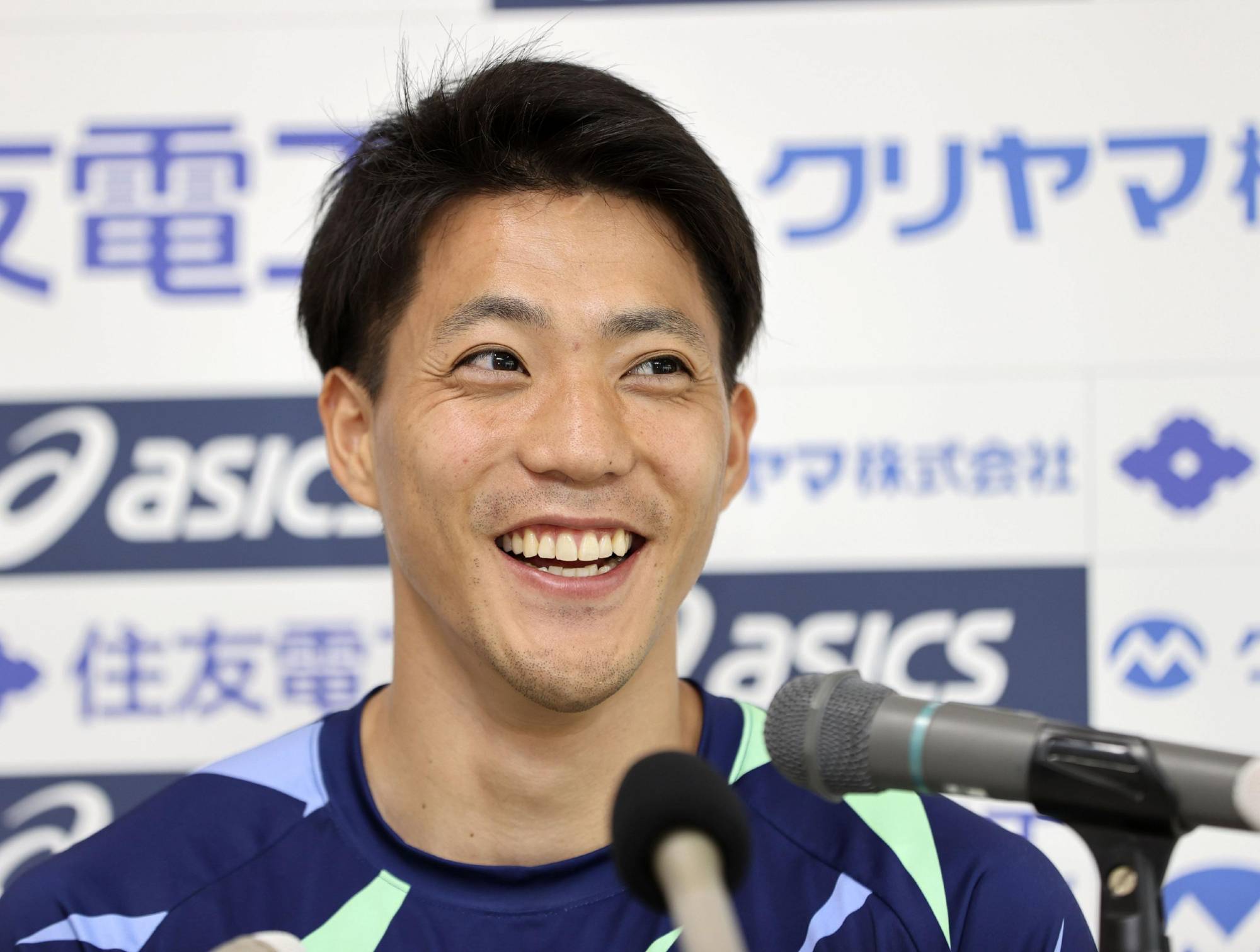Although he had not been the fastest sprinter in Japan, Ryota Yamagata had been recognized by many as the strongest because of his ability to rise to the occasion on bigger stages.
Now he has both titles — and with the Tokyo Olympics set to start in weeks, it couldn’t have come at a better time.
Three days after he stunned the Japanese public by clocking a men’s 100-meter national record of 9.95 seconds at the Fuse Sprint in Tottori Prefecture, Yamagata told reporters during an online group interview that he was fortunate and thankful to have achieved the result.
“While it became a birthday present for myself, it was a good present for my parents because I haven’t really done anything on Mother’s Day and Father’s Day,” said Yamagata, who turns 29 on Thursday. “(My parents) told me that I should not be satisfied until I clinch a berth at the Olympics.”
After years of frustration, his accomplishment has given Japanese track fans reason to celebrate the emergence of a potential finalist at the games.
But Yamagata, who has had to endure several setbacks from serious injuries to his lower back, knees and right ankle, has tried to use those injuries to help become a better sprinter.
Yamagata cited Hiroshi Shiraishi, his longtime acupuncturist and personal trainer, in saying that injuries can serve as “coaches” to improve his athletic performance.
“He said when I have pain and discomfort, those are signs from your body and you have to listen to what they say,” said the Hiroshima native, who has been called a “sprinting philosopher” for training on his own for years before hiring Daiki Takano as his coach this year. “Injuries happen when your body isn’t correctly in place, so you have to put it back in place. I’ve started thinking that way since when I was probably in high school.”

Yamagata, who became the fourth Japanese runner to crack the 10-second mark, stressed that the path to setting that time was not easy.
“The first time I became conscious about running under 10 seconds was when I was in junior high school,” Yamagata said with a smile. “But that’s when my personal best was 11.4. And I thought I’d try to eventually shave 1.5 seconds to make it happen during my sprinting career.
“I cut it down to 10.4 or 10.5 relatively quickly. But from that point on, there were roadblocks in part because of the injuries. I made it to 10 (seconds), but I’ve had injuries and things like that in the last two years.
“When I hurt my knees, I was worried about whether they would hold up for the speed I needed to run under 10 seconds. With all that said, I feel like I finally did it.”
Yamagata captured bronze with a 10-flat mark at the 2018 Asian Games in Jakarta, giving him momentum toward the 2019 world championships and Tokyo Games. But he experienced a collapsed lung in 2019.
“I’d been seriously looking to aim for the sub-10-second mark since April 2013, so I wish I could’ve broken it a little earlier,” Yamagata said.
But as his parents have suggested, Yamagata has no time to cherish his achievement. He needs to punch a ticket to his third Olympics by finishing third or better at the June 24-27 national championships — which will serve as Japan’s Olympic trials — at Osaka’s Yanmar Stadium.
Japan’s male sprinting pool is deeper than ever, and the Keio University alum will have to beat out runners like Yoshihide Kiryu, who was the first Japanese to break the 10-second barrier, and Abdul Hakim Sani Brown, who owned the previous national record of 9.97.
Yamagata also knows that he was helped by a tailwind of 2.0 meters/second, which is the legal limit, to come up with the 9.95 mark, and that he will need to reproduce a similar time to contend for a place in the Olympic final.
“I was assisted by the wind this time,” admitted Yamagata, who was part of the silver medal-winning team in the 4×100 relay and reached the 100-meter semifinals at the 2016 Rio Games.
“I will have to perform just as well without that assist. But I’ve now set a time that I hadn’t been able to see and I can consider that as a confidence builder, and I’ll feel that confidence as I try to compete in the final stage at the Olympics.”
In a time of both misinformation and too much information, quality journalism is more crucial than ever.
By subscribing, you can help us get the story right.
SUBSCRIBE NOW
KEYWORDS
Ryota Yamagata, 2020 Tokyo Olympics


